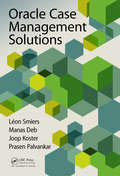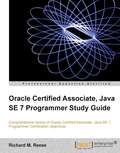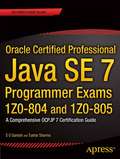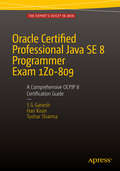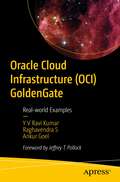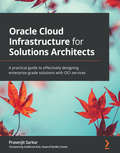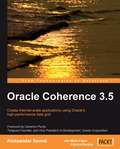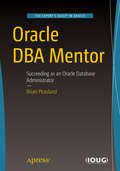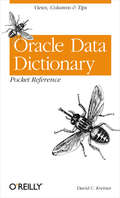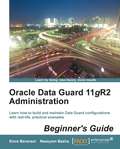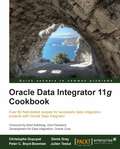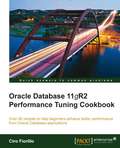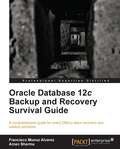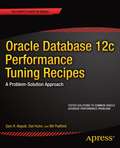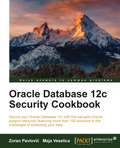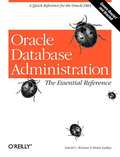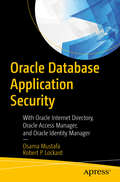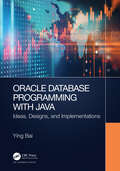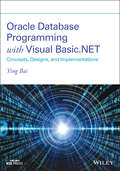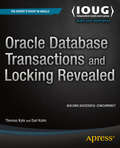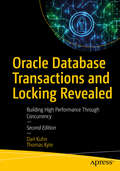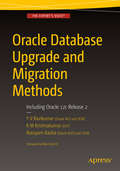- Table View
- List View
Oracle Case Management Solutions
by Manas Deb Prasen Palvankar Leon Smiers Joop KosterOrganizations increasingly need to deal with unstructured processes that traditional business process management (BPM) suites are not designed to deal with. High-risk, yet high-value, loan origination or credit approvals, police investigations, and healthcare patient treatment are just a few examples of areas where a level of uncertainty makes outc
Oracle Certified Associate, Java SE 7 Programmer Study Guide
by Richard M. ReeseEach objective is addressed using a series of programming examples. When the topic impacts memory, stack and heap illustrations are used to provide the reader with a more in depth understanding of the topic. At the end of each chapter, a series of sample questions are provided to reinforce your knowledge. This book is designed to help you prepare for the Oracle Certified Associate, Java SE 7 Programmer Certification exam (1Z0-803) and gain confidence in your understanding and use of Java. Basic knowledge of Java programming is expected.
Oracle Certified Professional Java SE 7 Programmer Exams 1Z0-804 and 1Z0-805
by S G Ganesh Tushar SharmaOracle Certified Professional Java SE 7 Programmer Exams 1Z0-804 and 1Z0-805 is a concise, comprehensive, step-by-step, and one-stop guide for the Oracle Certified Professional Java SE 7 Programmer Exam. The first two chapters set the stage for exam preparation and let the reader get started quickly. The first chapter answers frequently asked questions about the OCPJP exam. This book assumes that the reader is already familiar with Java fundamentals which is in line with the prerequisite of having a OCAJP certification. The book sports considerable supportive material to help the reader in effective exam preparation in the form of appendices: 2 mock tests to give the reader a sense of a real-exam. An instant refresher summarizing the most important concepts (with tips on answering questions) to revise just before the exam. This book will be a delectable read for any OCPJP aspirant because of its simple language, example driven approach, and easy-to-read style. Further, given its 100% focus on the exam and helpful supportive material, this book is clearly an attractive buy to OCPJP aspirants worldwide. What you'll learn In-depth coverage of all 13 exam topics for the certification. The book covers programming concepts succinctly with numerous illustrative programming and real-world examples. These examples will help the reader quickly internalize the discussed concepts. The reader will clearly understand the scope and objectives of the exam, the technical topics covered in the exam, and type and level-of-difficulty of the exam questions. With this, the reader will clearly know what's exactly required for passing the exam. Review questions tune the reader to an "exam mindset". By making mistakes and reading the detailed explanations for the answers, the reader will be better prepared for getting certified. Attempting the practice questions and mock test will help the reader gain necessary confidence to clear the exam. Who this book is for This book is targeted primarily at students and programmers who want to crack the OCPJP exam. Trainers and teachers can use this book as training material for OCPJP exam preparation. This book is also useful to readers who want to refresh their knowledge in Java programming or gain better understanding on using various Java APIs. Table of Contents 1. The OCPJP 7 Exam: Frequently Asked Questions (FAQ) 2. Pretest 3. Java Class Design 4. Advanced Class Design 5. Object-Oriented Design Principles 6. Generics and Collection 7. String Processing 8. Java I/O Fundamentals 9. Java File I/O (NIO. 2) 10. Building Database Applications with JDBC 11. Exceptions and Assertions 12. Localization 13. Threads 14. Concurrency 15. OCPJP 7 Quick Refresher 16. Appendix A: Exam Topics 17. Appendix B: Mock Exam 1 18. Appendix C: Mock Exam 2
Oracle Certified Professional Java SE 8 Programmer Exam 1Z0-809
by S G Ganesh Hari Kiran Tushar SharmaThis book offers a comprehensive guide for the Oracle Certified Professional Java SE 8 Programmer Exam. It starts by answering frequently asked exam questions followed by full coverage of exam topics with numerous programming and real-world examples. Each chapter ends with practice exam questions and a quick summary that reviews key concepts covered in the chapter from the OCPJP exam perspective. The book ends with a full-length, mock exam to ensure you have enough practice before actually taking the exam. If you are an OCPJP 8 exam aspirant, this book is certainly for you. The book assumes you''re already familiar with Java fundamentals, which is in keeping with the prerequisite for having a OCAJP 8 certification. You''ll enjoy reading Oracle Certified Professional Java SE 8 Programmer Exam 1Z0-809 because of its clear, simple language; example driven approach; easy-to-read style; and complete focus on the exam requirements. A few of the key features of the book include: In-depth and 100% coverage of all 12 exam topics for the certification Numerous illustrative programming and real-world examples Hundreds of practice exam questions (including a full-length mock exam) What you''ll learn * Have the necessary knowledge to clear the exam since 100% of the exam topics are covered to the required depth * Clearly understand the scope and objectives of the exam, the technical topics covered in the exam, and type and level-of-difficulty of the exam questions (in short, you will clearly know what''s exactly required for passing the exam) * Get into an "exam mindset" by trying out hundreds of practice exam questions. Who this book is for This book is targeted primarily at developers who want to crack the OCPJP 8 exam. Trainers and teachers can use this book as training material for OCPJP 8 exam preparation. This book is also useful to readers who want to refresh their knowledge in Java programming or gain better understanding on using various Java APIs. Table of Contents Table of Contents The OCPJP 8 Exam: Frequently Asked Questions (FAQ) 1. 1. Oracle Java Certifications: Overview 1. 2. The OCPJP 8 Exam 1. 3. Taking the OCPJP 8 Exam Java Class Design 2. 1. Implement encapsulation 2. 2. Implement inheritance including visibility modifiers and composition 2. 3. Implement polymorphism 2. 4. Override methods from Object class 2. 5. Create and use singleton classes and immutable classes 2. 6. Develop code that uses static keyword Advanced Java Class Design 3. 1. Develop code that uses abstract classes and methods 3. 2. Develop code that uses final keyword 3. 3. Create inner classes 3. 4. Use enumerated types 3. 5. Develop code that uses interfaces and use the atOverride annotation 3. 6. Create and use Lambda expressions Generics and Collections 4. 1. Create and use a generic class 4. 2. Create and use ArrayList, TreeSet, TreeMap, and ArrayDeque objects 4. 3. Use java. util. Comparator and java. lang. Comparable interfaces 4. 4. Collections Streams and Filters 4. 5. Iterate using forEach methods of Streams and List 4. 6. Describe Stream interface and Stream pipeline 4. 7. Filter a collection by using lambda expressions 4. 8. Use method references with Streams Lambda Built-in Functional Interfaces 5. 1. Use the built-in interfaces included in the java. util. function package 5. 2. Develop code that uses primitive versions of functional interfaces 5. 3. Develop code that uses binary versions of functional interfaces 5. 4. Develop code that uses the UnaryOperator interface Java Stream API 6. 1. Develop code to extract data from an object 6. 2. Search for data by using search methods of the Stream classes 6. 3. Develop code that uses the Optional class 6. 4. Develop code that uses Stream data methods and calculation methods 6. 5. Sort a collection using Stream API 6. 6. Save results to a collection using the collect method and use Collectors class 6. 7. Use of merge() and flatMap() methods of the Stream API Exceptions and Assertions 7. 1. Use try-catch and throw statemen...
Oracle Cloud Infrastructure (OCI) GoldenGate: Real-world Examples
by Ankur Goel Y V Ravi Kumar Raghavendra SThis book focuses on the utilization of GoldenGate Services (GGS) in conjunction with a microservices architecture on the Oracle cloud (OCI), primarily for data migration and integration across various data sources and targets.The book begins with a practical example of utilizing GGS on a Marketplace VM, progressively advancing to in-depth discussions on implementing GoldenGate as a Service on OCI. The book offers illustrative guides for data replication between RDBMSs (such as Oracle, Postgres, and big data targets such as Kafka). Additionally, it explores monitoring techniques using Enterprise Manager and Grafana dashboards. A comparative analysis is presented between traditional VM-based GoldenGate installations and the OCI service model. Special attention is given to Zero Downtime Migration (ZDM) and leveraging GGS for database migration from on-premises to OCI. Some chapters address multi-cloud replication using OCI GGS and include real-life case studies.By the end of this book you will have gained comprehensive insights into the architectural design of GoldenGate Services and will be adept at replicating data using GGS, enabling you to replicate setups in your own environments.What You Will LearnSet up GoldenGate Services for high availability (HA), disaster recovery (DR), migration of data to cloud, and moving data into the data lake or lakehousePerform logical migration of data to the cloud using the ZDM tool (ZDM uses GoldenGate internally).Replicate data to big data targetsMonitor GGS using Enterprise Manager and GrafanaReplicate data in a multi-cloud environment Who This Book Is ForOracle database administrators who want to replicate data or use Oracle GoldenGate Services for migration and setup of high availability (HA) and disaster recovery (DR); and data engineers who want tobuild the data warehouse, data lake, data lakehouse to push data in near real-time
Oracle Cloud Infrastructure for Solutions Architects: A practical guide to effectively designing enterprise-grade solutions with OCI services
by Prasenjit Sarkar Guillermo RuizDevelop enterprise architect skills by building secure, highly available, and cost-effective solutions with Oracle Functions, Terraform, and the Oracle Cloud VMware SolutionKey FeaturesExplore Oracle's Gen 2.0 Cloud infrastructure and its high-performance computing capabilitiesUnderstand hybrid cloud capabilities and learn to migrate apps from on-premises VMware clusters to OCILearn to create Kubernetes clusters and run containerized applications on Oracle's Container EngineBook DescriptionOracle Cloud Infrastructure (OCI) is a set of complementary cloud services that enables you to build and run a wide range of applications and services in a highly available hosted environment. This book is a fast-paced practical guide that will help you develop the capabilities to leverage OCI services and effectively manage your cloud infrastructure. Oracle Cloud Infrastructure for Solutions Architects begins by helping you get to grips with the fundamentals of Oracle Cloud Infrastructure, and moves on to cover the building blocks of the layers of Infrastructure as a Service (IaaS), such as Identity and Access Management (IAM), compute, storage, network, and database. As you advance, you'll delve into the development aspects of OCI, where you'll learn to build cloud-native applications and perform operations on OCI resources as well as use the CLI, API, and SDK. Finally, you'll explore the capabilities of building an Oracle hybrid cloud infrastructure. By the end of this book, you'll have learned how to leverage the OCI and gained a solid understanding of the persona of an architect as well as a developer's perspective.What you will learnBecome well-versed with the building blocks of OCI Gen 2.0 CloudControl access to your cloud resources using IAM componentsManage and operate various compute instancesTune and configure various storage options for your appsDevelop applications on OCI using OCI Registry (OCIR), Cloud Shell, OCI Container Engine for Kubernetes (OKE), and Service MeshDiscover ways to use object-relational mapping (ORM) to create infrastructure blocks using Terraform codeWho this book is forThis book is for cloud architects, cloud developers, and DevSecOps engineers who want to learn how to architect and develop on Oracle Cloud Infrastructure by leveraging a wide range of OCI IAAS capabilities. Working knowledge of Linux, exposure to basic programming, and a basic understanding of networking concepts are needed to get the most out of this book.
Oracle Coherence 3.5
by Aleksandar Seovic Mark FalcoThis title covers Coherence features progressively, from simple to more advanced topics, and provides best-practice guidance on when and how to use each. Numerous examples are provided throughout the book that will help you become familiar with Coherence APIs. You will also be able to reuse many of the sample classes or mini-frameworks encapsulating Coherence best practice and providing missing features directly within your own applications. This should significantly increase your productivity when developing Coherence applications. Finally, a sample application that you can download from the companion web site will show you how to use Coherence as part of the broader infrastructure stack, including Spring Framework and Hibernate, as well as how to access Coherence from a WPF-based .NET desktop application. This book is written for architects and developers responsible for the design and development of Internet or Enterprise applications (web-based or otherwise) that need to scale to support a large number of simultaneous users, while at the same time providing fast response times and high availability. The book assumes a solid knowledge of Java, and a familiarity with Domain Driven Design (DDD) is helpful.
Oracle DBA Mentor: Succeeding as an Oracle Database Administrator
by Brian PeaslandNew Oracle database administrators can get off the ground running. This book helps you develop the ability to think on your feet and move focus in an instant from arcane syntax details to broad, corporate issues. Along the way, you will see how to create your first database and implement best practices to ensure a well-running database system.What makes Oracle DBA Mentor different is that it also teaches you how to obtain answers that are not found in this or other books. Focus is given to creating a test bed and running test cases to examine hypotheses and prove out solutions so you can be sure they work in production. Attention is given to navigating product documentation and networking in forums and social media to build your skills and a network to draw on when solving problems under pressure. There are chapters of step-by-step technical content as well as coverage of essential skills to succeed as a DBA no matter which database engine you administer.By the time you are done reading this book, you will have confidence to face many of the situations thrown in your direction. You will know where to go for the answers you don’t yet know that you need. You’ll be able to work and troubleshoot under pressure. You’ll know how to create a database, institute backup and recovery procedures, secure the database and its valuable corporate data, and acquire more knowledge as needed so you can run a database to meet the needs of your organization. What You'll LearnInstall Oracle Database with best practicesImplement backup and recovery proceduresUnderstand the fundamentals of databases and data securityFind answers to technical problems using Oracle documentation, Oracle Support, and other resourcesPatch and upgrade an Oracle databaseWho This Book Is ForThe novice database administrator who wants help getting off the ground with their DBA career, and in building the skills to let that career flourish in the long term. Mid-level DBAs will also find the book helpful as they try to grow their career to the next level. While the book is geared toward the Oracle platform, database administrators from other platforms can benefit from the soft skills covered in this book.
Oracle Data Dictionary Pocket Reference
by David C. Kreines<p><i>Oracle Data Dictionary Pocket Reference</i> gives DBAs and developers at any level quick and easy access to the data dictionary in Oracle's latest database, Oracle9i. This pocket-sized book provides a complete list of the most commonly used tables and views in the Oracle9i data dictionary, intelligently arranged for quick reference. It also includes column names and descriptions for each of the tables and views, as well as helpful tips, warnings, and usage examples. When you've reached a sticking point in your work and want to check your facts quickly, the <i>Oracle Data Dictionary Pocket Reference</i> is the book to have close by.</p>
Oracle Data Dictionary Pocket Reference: Views, Columns & Tips
by David C. KreinesIf you work with Oracle, then you don't need to be told that the data dictionary is large and complex, and grows larger with each new Oracle release. It's one of the basic elements of the Oracle database you interact with regularly, but the sheer number of tables and views makes it difficult to remember which view you need, much less the name of the specific column. Want to make it simpler? The Oracle Data Dictionary Pocket Reference puts all the information you need right at your fingertips. Its handy and compact format lets you locate the table and view you need effortlessly without stopping to interrupt your workOracle Data Dictionary Pocket Reference gives DBAs and developers at any level quick and easy access to the data dictionary in Oracle's latest database, Oracle9i. This pocket-sized book provides a complete list of the most commonly used tables and views in the Oracle9i data dictionary, intelligently arranged for quick reference. It also includes column names and descriptions for each of the tables and views, as well as helpful tips, warnings, and usage examples.O'Reilly's Pocket References have become a favorite among developers and database administrators everywhere. By providing a wealth of important details in a concise, well-organized format, these handy books deliver just what you need to complete the task at hand. When you've reached a sticking point in your work and want to check your facts quickly, the Oracle Data Dictionary Pocket Reference is the book to have close by.
Oracle Data Guard 11gR2 Administration Beginner's Guide
by Emre Baransel Nassyam BashaUsing real-world examples and hands-on tasks, Oracle Data Guard 11gR2 Administration Beginner's Guide will give you a solid foundation in Oracle Data Guard. It has been designed to teach you everything you need to know to successfully create and operate Data Guard environments with maximum flexibility, compatibility, and effectiveness.If you are an Oracle database administrator who wants to configure and administer Data Guard configurations, then "Oracle Data Guard 11gR2 Administration Beginner's Guide" is for you. With a basic understanding of Oracle database administration, you'll be able to easily follow the book.
Oracle Data Integrator 11g Cookbook
by Peter C. Boyd-Bowman Julien Testut Denis Gray Christophe DupupetWritten as a practical Cookbook, the recipes in this essential guide will help you make the most out of Oracle Data Integrator 11g.This book is meant for people who already possess a basic understanding of Oracle Data Integrator and want to take it to the next level by learning how to better leverage advanced ODI features and functionality as they continue to develop and manage their data integration projects.
Oracle Database 11g – Underground Advice for Database Administrators
by April C. SimsThis book is designed to cover the problems that novice DBAs particularly struggle with. This handbook covers a minimal amount of theoretical information before showing you how to overcome common problems through the use of real-life examples. It covers both Oracle 11g R1 and 11g R2 in examples, with material applicable to all versions of Oracle. This book is for you if you find yourself in charge of an Oracle database. It can be easy to feel overwhelmed. Whether you are a single employee or the DBA manager of several employees, whether you are taking over an existing position or taking up a newly created one - this book is designed to be a sanity check. If you need guidance for migrating to 11g or implementing Oracle's Maximum Availability Architecture, you will find this book very helpful.
Oracle Database 11gR2 Performance Tuning Cookbook
by Ciro FiorilloIn this book you will find both examples and theoretical concepts covered. Every recipe is based on a script/procedure explained step-by-step, with screenshots, while theoretical concepts are explained in the context of the recipe, to explain why a solution performs better than another. This book is aimed at software developers, software and data architects, and DBAs who are using or are planning to use the Oracle Database, who have some experience and want to solve performance problems faster and in a rigorous way. If you are an architect who wants to design better applications, a DBA who is keen to dig into the causes of performance issues, or a developer who wants to learn why and where the application is running slow, this is the book for you. Basic knowledge of SQL language is required and general knowledge of the Oracle Database architecture is preferable.
Oracle Database 12c Backup and Recovery Survival Guide
by Aman Sharma Francisco Munoz AlvarezThe book follows a tutorial-based approach, covering all the best practices for backup and recovery. The book starts by introducing readers to the world of backup and recovery, then moves on to teach them the new features offered by Oracle 12c. The book is full of useful tips and best practices that are essential for any DBA to perform backup and recovery operations in an organization.This book is designed for Oracle DBAs and system administrators. The reader will have a basic working experience of administering Oracle databases. This book is designed for Oracle DBAs and system administrators.This book will become a reference guide and will also help you to learn some new skills, and give you some new ideas you never knew about, helping you to easily find the solution to some of the most well-known problems you could encounter as DBAs.
Oracle Database 12c Performance Tuning Recipes
by Darl Kuhn Sam R. Alapati Bill PadfieldPerformance problems are rarely "problems" per se. They are more often "crises" during which you're pressured for results by a manager standing outside your cubicle while your phone rings with queries from the help desk. You won't have the time for a leisurely perusal of the manuals, nor to lean back and read a book on theory. What you need in that situation is a book of solutions, and solutions are precisely what Oracle Database 12c Performance Tuning Recipes delivers. Oracle Database 12c Performance Tuning Recipes is a ready reference for database administrators in need of immediate help with performance issues relating to Oracle Database. The book takes an example-based approach, wherein each chapter covers a specific problem domain. Within each chapter are "recipes," showing by example how to perform common tasks in that chapter's domain. Solutions in the recipes are backed by clear explanations of background and theory from the author team. Whatever the task, if it's performance-related, you'll probably find a recipe and a solution in this book. Provides proven solutions to real-life Oracle performance problems Offers relevant background and theory to support each solution Gets straight to the point for when you're under pressure for results What you'll learn Optimize the use of memory and storage Monitor performance and troubleshoot problems Identify and improve poorly-performing SQL statements Adjust the most important optimizer parameters to your advantage Create indexes that get used and make a positive impact upon performance Automate and stabilize using key features such as SQL Tuning Advisor and SQL Plan Baselines Who this book is for Oracle Database 12c Performance Tuning Recipes is aimed squarely at Oracle Database administrators. The book especially appeals to those administrators desiring to have at their side a ready-to-go set of solutions to common database performance problems. Table of Contents Optimizing Table Performance Choosing and Optimizing Indexes Optimizing Instance Memory Monitoring System Performance Minimizing System Contention Analyzing Operating System Performance Troubleshooting the Database Creating Efficient SQL Manually Tuning SQL Tracing SQL Execution Automated SQL Tuning Execution Plan Optimization and Consistency Configuring the Optimizer Implementing Query Hints Executing SQL in Parallel
Oracle Database 12c Security Cookbook
by Maja Veselica Zoran PavlovicSecure your Oracle Database 12c with this valuable Oracle support resource, featuring more than 100 solutions to the challenges of protecting your data About This Book * Explore and learn the new security features introduced in Oracle Database 12c, to successfully secure your sensitive data * Learn how to identify which security strategy is right for your needs - and how to apply it * Each recipe' provides you with a single step-by-step solution, making this book a vital resource, delivering Oracle support in one accessible place Who This Book Is For This book is for DBAs, developers, and architects who are keen to know more about security in Oracle Database 12c. This book is best suited for beginners and intermediate-level database security practitioners. Basic knowledge of Oracle Database is expected, but no prior experience of securing a database is required. What You Will Learn * Analyze application privileges and reduce the attack surface * Reduce the risk of data exposure by using Oracle Data Redaction and Virtual Private Database * Control data access and integrity in your organization using the appropriate database feature or option * Learn how to protect your databases against application bypasses * Audit user activity using the new auditing architecture * Restrict highly privileged users from accessing data * Encrypt data in Oracle Database * Work in a real-world environment where a multi-layer security strategy is applied In Detail Businesses around the world are paying much greater attention toward database security than they ever have before. Not only does the current regulatory environment require tight security, particularly when dealing with sensitive and personal data, data is also arguably a company's most valuable asset - why wouldn't you want to protect it in a secure and reliable database? Oracle Database lets you do exactly that. It's why it is one of the world's leading databases - with a rich portfolio of features to protect data from contemporary vulnerabilities, it's the go-to database for many organizations. Oracle Database 12c Security Cookbook helps DBAs, developers, and architects to better understand database security challenges. Let it guide you through the process of implementing appropriate security mechanisms, helping you to ensure you are taking proactive steps to keep your data safe. Featuring solutions for common security problems in the new Oracle Database 12c, with this book you can be confident about securing your database from a range of different threats and problems. Style and approach Each chapter explains the different aspects of security through a series of recipes. Each recipe presents instructions in a step-by-step manner, supported by explanations of the topic.
Oracle Database Administration, The Essential Reference
by David C. Kreines Brian LaskeyA concise reference to the enormous store of information Oracle8 or Oracle7 DBAs need every day, Oracle Database Administrationcovers DBA tasks like installation, tuning, backups, networking, auditing, and query optimization. It's also a set of quick references on initialization parameters, SQL statements, data dictionary tables, system privileges, roles, and syntax for SQL*Plus, Export, Import, and SQL*Loader.
Oracle Database Application Security: With Oracle Internet Directory, Oracle Access Manager, and Oracle Identity Manager
by Osama Mustafa Robert P. LockardFocus on the security aspects of designing, building, and maintaining a secure Oracle Database application. Starting with data encryption, you will learn to work with transparent data, back-up, and networks. You will then go through the key principles of audits, where you will get to know more about identity preservation, policies and fine-grained audits. Moving on to virtual private databases, you’ll set up and configure a VPD to work in concert with other security features in Oracle, followed by tips on managing configuration drift, profiles, and default users. Shifting focus to coding, you will take a look at secure coding standards, multi-schema database models, code-based access control, and SQL injection. Finally, you’ll cover single sign-on (SSO), and will be introduced to Oracle Internet Directory (OID), Oracle Access Manager (OAM), and Oracle Identity Management (OIM) by installing and configuring them to meet your needs. Oracle databases hold the majority of the world’s relational data, and are attractive targets for attackers seeking high-value targets for data theft. Compromise of a single Oracle Database can result in tens of millions of breached records costing millions in breach-mitigation activity. This book gets you ready to avoid that nightmare scenario.What You Will LearnWork with Oracle Internet Directory using the command-line and the console Integrate Oracle Access Manager with different applications Work with the Oracle Identity Manager console and connectors, while creating your own custom one Troubleshooting issues with OID, OAM, and OIDDive deep into file system and network security concepts Who This Book Is ForOracle DBAs and developers. Readers will need a basic understanding of Oracle RDBMS and Oracle Application Server to take complete advantage of this book.
Oracle Database Performance and Scalability: A Quantitative Approach (Quantitative Software Engineering Series #12)
by Henry H. LiuThe innovative performance and scalability features with each newer edition of the Oracle database system can present challenges for users. This book teaches software developers and students how to effectively deal with Oracle performance and scalability issues throughout the entire life cycle of developing Oracle-based applications. Using real-world case studies to deliver key theories and concepts, the book introduces highly dependable and ready-to-apply performance and scalability optimization techniques, augmented with Top 10 Oracle Performance and Scalability Features as well as a supplementary support website.
Oracle Database Programming with Java: Ideas, Designs, and Implementations
by Ying BaiDatabases have become an integral part of modern life. Today’s society is an information-driven society, and database technology has a direct impact on all aspects of daily life. Decisions are routinely made by organizations based on the information collected and stored in databases. Database management systems such as Oracle are crucial to apply data in industrial or commercial systems. Equally crucial is a graphical user interface (GUI) to enable users to access and manipulate data in databases. The Apache NetBeans IDE with Java is an ideal candidate for developing a GUI with programming functionality.Oracle Database Programming with Java: Ideas, Designs, and Implementations is written for college students and software programmers who want to develop practical and commercial database programming with Java and relational databases such as Oracle Database XE 18c. The book details practical considerations and applications of database programming with Java and is filled with authentic examples as well as detailed explanations. Advanced topics in Java Web, like Java Web Applications and Java Web Services, are covered in real project examples to show how to handle the database programming issues in the Apache NetBeans IDE environment.This book features: A real sample database, CSE _ DEPT, which is built with Oracle SQL Developer, provided and used throughout the book Step by step, detailed illustrations and descriptions of how to design and build a practical relational database Fundamental and advanced Java database programming techniques practical to both beginning students and experienced programmers Updated Java desktop and Web database programming techniques, such as Java Enterprise Edition 7, JavaServer Pages, JavaServer Faces, Enterprise Java Beans, Web applications and Web services, including GlassFish and Tomcat Web servers More than 30 real database programming projects with detailed illustrations Actual JDBC APIs and JDBC drivers, along with code explanations Homework and selected solutions for each chapter to strengthen and improve students’ learning and understanding of the topics they have studied
Oracle Database Programming with Visual Basic.NET: Concepts, Designs, and Implementations
by Ying BaiOracle Database Programming with Visual Basic.NET Discover a detailed treatment of the practical considerations and applications of Oracle database programming with Visual Basic 2019Oracle Database Programming with Visual Basic.NET: Concepts, Designs, and Implementations delivers a comprehensive exploration of the foundations of Oracle database programming using Visual Basic.NET. Using Visual Basic.NET 2019, Visual Studio.NET 2019, and Oracle 18c XE, the book introduces the Oracle database development system, Oracle SQL Developer and Modeler, and teaches readers how to implement a sample database solution.The distinguished author also demonstrates the use of dotConnect for Oracle to show readers how to create an effective connection to an Oracle 18c XE database. The current versions of the .NET framework, ASP.NET, and ASP.NET 4.7 are also explored and used to offer readers the most up to date web database programming techniques available today.The book provides practical example projects and detailed, line-by-line descriptions throughout to assist readers in the development of their database programming skill. Students will also benefit from the inclusion of:A thorough introduction to databases, including definitions, examples, descriptions of keys and relationships, and some database components in popular databases, like Access, SQL, and OracleAn exploration of ADO.NET, including its architecture and components, like the DataReader class, DataSet component, DataTable component, and the command and parameter classesA discussion of Language Integrated Query (LINQ), including its architecture and components, its relationship to objects, DataSet, Oracle, and EntitiesAn explanation of how to access data in ASP.NET and ASP.NET Web Services with multiple real project examples.Perfect for college and university students taking courses related to database programming and applications, Oracle Database Programming with Visual Basic.NET will also earn a place in the libraries of programmers and software engineers seeking a comprehensive reference for database coding in Visual Basic.NET.
Oracle Database Transactions and Locking Revealed
by Darl Kuhn Thomas KyteOracle Database Transactions and Locking Revealed provides much-needed information for building scalable, high-concurrency applications and deploy them against the Oracle Database. Read this short, 150-page book that is adapted from Expert Oracle Database Architecture to gain a solid and accurate understanding of how locking and concurrency are dealt with by Oracle Database. Also learn how the Oracle Database architecture accommodates user transactions, and how you can write code to mesh with how Oracle Database is designed to operate. Good transaction design is an important facet of highly-concurrent applications that are run by hundreds, even thousands of users who are all executing transactions at the same time. Transaction design in turn relies upon a good understanding of how the underlying database platform manages of the locking of resources so as to prevent access conflicts and data loss that might otherwise result from concurrent access to data in the database. Oracle Database Transactions and Locking Revealed covers in detail the various lock types, and also different locking schemes such as pessimistic and optimistic locking. Then you'll learn about transaction isolation and multiversion concurrency, and how the various lock types support Oracle Database's transactional features. You'll learn some good tips for transaction design, as well as some bad practices and habits to avoid. Coverage is also given to redo and undo, and their role in concurrency. This is an important book that anyone developing highly-concurrent applications will want to have handy on their shelf. What you'll learn Understand locks and their implication for concurrent applications Manage transaction isolation to meet business needs while not impeding concurrency Design effective transactions and choose the correct atomicity level for your needs Take advantage of features such as deferrable constraints and autonomous transactions Build multi-database applications with needed atomicity through distributed transactions Investigate and troubleshoot redo and undo problems that can impede concurrency Who this book is for Oracle Database Transactions and Locking Revealed is the definitive book on transactions and locking for Oracle Database developers and architects who are developing highly-concurrent applications. Readers should already have good understanding of SQL and PL/SQL. Experience in application development is also beneficial. Table of Contents 1. Building for Concurrency 2. Locking and Issues 3. Lock Types 4. Concurrency and Multiversioning 5. Transactions 6. Redo and Undo 7. Investigating Undo 8. Investigating Undo
Oracle Database Transactions and Locking Revealed: Building High Performance Through Concurrency
by Darl Kuhn Thomas KyteAccess much-needed information for building scalable, high-concurrency applications and deploying them against the Oracle Database. This new edition is updated to be current with Oracle Database 19. It includes a new chapter with troubleshooting recipes to help you quickly diagnose and resolve locking problems that are urgent and block production.Good transaction design is an important facet of highly-concurrent applications that are run by hundreds, even thousands, of users who are executing transactions at the same time. Transaction design, in turn, relies on a good understanding of how the database engine manages the locking of resources to prevent access conflicts and data loss that might otherwise result from concurrent access to data in the database. This book provides a solid and accurate explanation of how locking and concurrency are dealt with by Oracle Database. You will learn how the Oracle Database architecture accommodates user transactions, and how you can write code to mesh with the way in which Oracle Database is designed to operate.Oracle Database Transactions and Locking Revealed covers in detail the various lock types, and also different locking schemes such as pessimistic and optimistic locking. Then you will learn about transaction isolation and multi-version concurrency, and how the various lock types support Oracle Database’s transactional features. You will learn tips for transaction design, as well as some bad practices and habits to avoid. Coverage is also given to redo and undo, and their role in concurrency. The book is loaded with insightful code examples that drive home each concept. This is an important book that anyone developing highly-concurrent applications will want to have handy on their shelf.What You Will LearnAvoid application lockups due to conflicts over accessing the same resourceUnderstand how Oracle prevents one application from overwriting another’s modificationsCreate transaction designs that mesh with how Oracle Database is designedBuild high-throughput applications supporting thousands of concurrent usersDesign applications to take full advantage of Oracle’s powerful database engineGain a fundamental knowledge of Oracle’s transaction and locking architectureDevelop techniques to quickly diagnose and resolve common locking issuesWho This Book Is ForOracle developers and database administrators faced with troubleshooting and solving deadlocks, locking contention, and similar problems that are encountered in high-concurrency environments; and application developers wanting to design their applications to excel at multi-user concurrency by taking full advantage of Oracle Database’s multi-versioning and concurrency support
Oracle Database Upgrade and Migration Methods
by Nassyam Basha Y V Ravikumar K M KrishnakumarLearn all of the available upgrade and migration methods in detail to move to Oracle Database version 12c. You will become familiar with database upgrade best practices to complete the upgrade in an effective manner and understand the Oracle Database 12c patching process. So it's time to upgrade Oracle Database to version 12c and you need to choose the appropriate method while considering issues such as downtime. This book explains all of the available upgrade and migration methods so you can choose the one that suits your environment. You will be aware of the practical issues and proactive measures to take to upgrade successfully and reduce unexpected issues. With every release of Oracle Database there are new features and fixes to bugs identified in previous versions. As each release becomes obsolete, existing databases need to be upgraded. Oracle Database Upgrade and Migration Methods explains each method along with its strategy, requirements, steps, and known issues that have been seen so far. This book also compares the methods to help you choose the proper method according to your constraints. Also included in this book: Pre-requisite patches and pre-upgrade steps Patching to perform changes at the binary and database level to apply bug fixes What You Will Learn: Understand the need and importance of database upgrading and migration Be aware of the challenges associated with database upgrade decision making Compare all upgrade/migration methods Become familiar with database upgrade best practices and recommendations Understand database upgrade concepts in high availability and multi-tenant environments Understand Oracle 12c patching concepts Know the database downgrade steps in case the upgraded database isn't compatible with the environment Know the features and benefits to the organizations when it moves from the old database version to the latest database version Who This Book Is For: Core database administrators, solution architects, business consultants, and database architects
